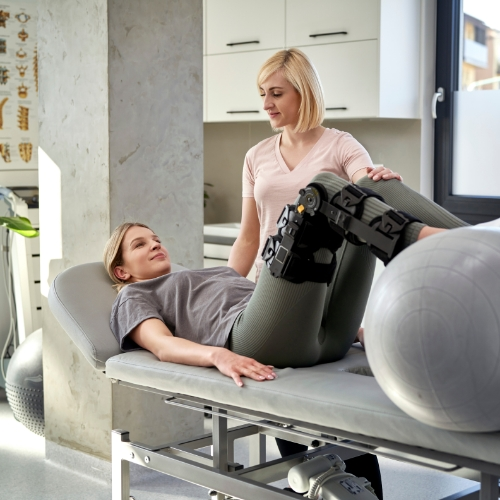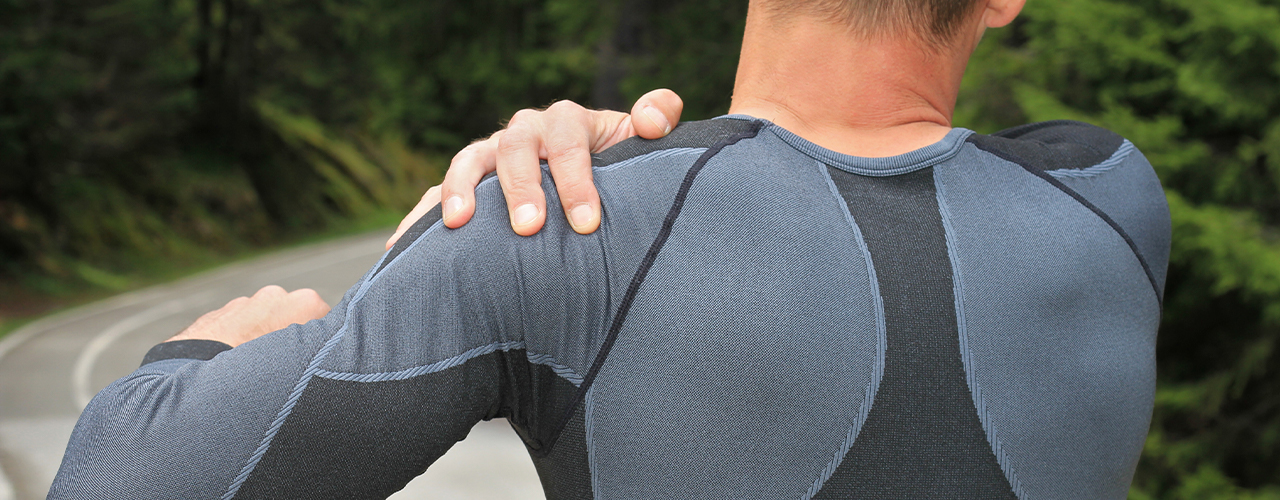
How Physical Therapy Can Help Your Recovery
Physical therapy (PT) is a healthcare specialty focusing on preventing, treating, and managing movement disorders and physical impairments. Our physical therapists at Full Potential Physical Therapy in Holland, MI are musculoskeletal experts who use different techniques and exercises to help patients improve their physical function and mobility, reduce pain, and prevent injury or disability.
Physical therapy is often prescribed as a treatment for a wide range of conditions, including musculoskeletal injuries, neurological disorders, sports injuries, chronic pain, and post-surgical rehabilitation. Depending on the individual’s needs and situation, PT sessions may involve manual therapy, strengthening exercises, mobility work, modalities (i.e., ultrasound, electrical stimulation, heat or cold therapy), and other techniques.
Our physical therapists in Holland, MI use cutting-edge strategies to help patients regain their independence and improve their quality of life by restoring their physical abilities, reducing pain, and improving their overall health. Your therapy sessions are designed to meet your unique needs and goals.
We approach patient care using proven methods that research has demonstrated to be the most effective way to address all aspects of their overall function. Rather than getting lost trying to treat symptoms, we emphasize getting to the root cause of your issues to ensure results!
Call (616) 392-2172 to schedule your first appointment!
Common Conditions Physical Therapists Treat
At Full Potential Physical Therapy, we understand the unique journeys of our patients and the challenges they face with various conditions and disorders. In outpatient physical therapy, we encounter a range of common disorders that can impede one’s freedom and sense of normalcy. Our dedicated and experienced team is committed to guiding you toward optimal recovery with a results-driven approach.
Our physical therapists in treat a variety of conditions, the most common of which include:
- Musculoskeletal Disorders: Encompassing conditions related to arthritis, tendonitis, spinal and peripheral joint problems. These disorders impact the bones, muscles, and connective tissues. Symptoms often involve pain, stiffness, and restricted mobility.
- Neurological Disorders: Stroke, Parkinson’s disease, and multiple sclerosis are among the most common neurological disorders we treat. Patients often struggle with muscle weakness, coordination problems, and balance issues.
- Orthopedic Injuries: From sports injuries to post-surgical recovery, we treat various orthopedic conditions, including sprains and strains. These conditions typically present with swelling, pain, and decreased range of motion.
- Chronic Pain Conditions: Conditions like fibromyalgia and chronic fatigue syndrome can cause persistent pain, fatigue, and difficulty with daily tasks.
Any one or combination of these conditions can severely impact daily activities and make achieving personal and professional goals seem out of reach. But it’s important to remember that there’s always a path to improvement.
At Full Potential Physical Therapy, we believe in the power of individualized, patient-centric care. Leveraging the latest research and evidence-based practices, our physical therapists design personalized treatment plans to help patients reclaim their lives from these conditions. Our mission is to treat the source of a patient’s symptoms and empower each patient, helping them regain their strength, confidence, and sense of self.
At Full Potential Physical Therapy, we are committed to helping you get back to doing what you love! Book your appointment now!
What to expect at your physical therapy sessions
At Full Potential Physical Therapy, we strive to make your process smooth, positive, and empowering. Our dedicated physical therapists delve into your past and present health conditions, surgeries, injuries, and lifestyle habits. This rigorous evaluation helps us understand your unique health profile, enabling us to tailor a treatment plan that meets your specific needs.
Next, we assess your range of motion and strength. This information provides essential insights into your overall physical capabilities and limitations. This information forms the cornerstone of your personalized treatment plan.
Our therapists will conduct comprehensive balance, coordination, and functional movement screens to identify any abnormalities that might be contributing to your discomfort or limiting your activities. These tests provide us with a view of your physical performance, further enabling us to customize your treatment regimen.
Our commitment to research-backed, individualized methods ensures you receive the most effective, results-oriented care possible. Some of the common treatments we may use include the following:
- Manual Therapy: Manual therapy techniques may include joint mobilizations, manipulations, and soft tissue techniques such as massage or myofascial release. These methods can help to improve circulation, drain excess fluid from tissues, and promote overall relaxation and healing.
- Therapeutic Exercises: These exercises may focus on improving range of motion, strengthening muscles, improving balance and coordination, or enhancing endurance. These may include stretching exercises, resistance training, postural exercises, and balance activities.
- Neuromuscular Re-education: This treatment approach is designed to restore normal body movement patterns. It involves techniques that retrain the nervous system to control and coordinate muscle activity effectively.
- Patient Education: A crucial component of physical therapy, patient education involves teaching patients about their conditions, the healing process, and how to prevent future injuries. This education empowers patients to participate in their recovery actively and promotes long-term health.
Physical therapy doesn’t just alleviate symptoms—it also improves overall function. Physical therapy can pave the way to a healthier, more active lifestyle, whether you’re looking to return to your favorite sport, perform daily activities without pain, or improve your general fitness.
Contact us today to schedule your initial evaluation with one of our expert physical therapists!
A Better Life is Only Four Steps Away
Physical therapy can be an unfamiliar experience for many. To orient new patients to the process, we have divided their rehab journey into four segments called “The Four Phases of Getting Better.” It is important to note that while there are four phases utilized over the course of your care, they are not totally separate. They move gradually toward greater strengthening and function, which is the end goal to return confidently to the life you desire to live.1
Pain Relief
The first focus in getting better is pain relief. After your evaluation, your physical therapist will use hands-on techniques or manual therapy, light therapeutic exercise, and education on how to modify your activity and posture in order to give you more control over your pain. In this stage, modalities like ice, heat, myofascial release, electric stimulation and kinesiotape may be used.
2
Improve Mobility/Flexibility
The second step in this method is to improve mobility and flexibility. Your therapist will design a progressive program of range of motion and light stretching to restore mobility and reduce pain.
3
Improve Strength/Control
In the third step of this method, muscle weakness will be addressed to help you maintain the gains and momentum you achieve through phases one and two. A thorough strengthening process is the step that gives results that last, and this will prepare you for more functional training – the final step.
4
Functional Training
Now that your pain is resolved and you have the necessary mobility and strength, your program can be advanced into functional training. Whether you are returning to work, returning to life after post-op rehabilitation, getting back into recreation or sports, or simply returning to the activities of daily life, this step helps ensure your success after graduation and empowers you to be confident in your abilities again.

Reach Your Full Potential & Live Pain-Free!
Book A Free Consultation
Book a Free Consultation Today to Find Out How Physical Therapy Can Help You Find Relief!
request an appointment
Reach Your Full Potential and Live Life Pain-Free! Request an Appointment to Get Started Today!




